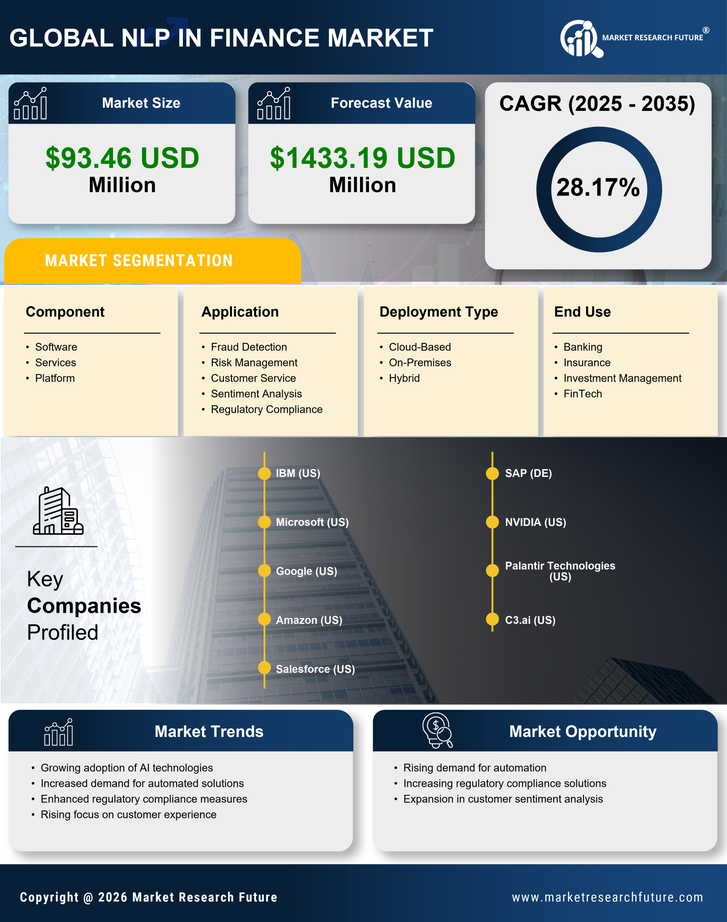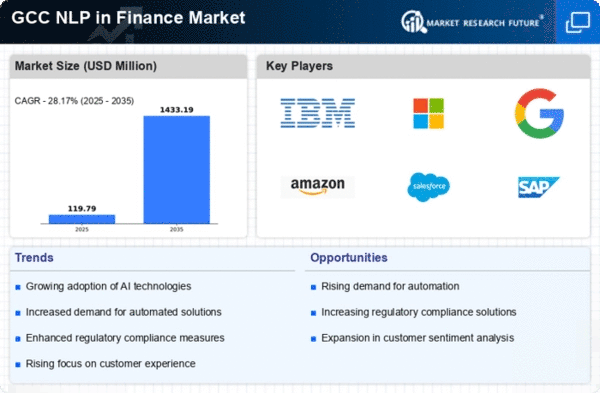The nlp in-finance market is currently characterized by a dynamic competitive landscape, driven by rapid technological advancements and increasing demand for automation in financial services. Key players such as IBM (US), Microsoft (US), and Google (US) are at the forefront, leveraging their extensive resources to innovate and expand their offerings. IBM (US) focuses on integrating AI with its Watson platform, enhancing its capabilities in natural language processing to provide tailored solutions for financial institutions. Meanwhile, Microsoft (US) emphasizes partnerships with regional banks to facilitate digital transformation, thereby solidifying its market presence. Google (US) appears to be concentrating on developing advanced analytics tools that utilize machine learning to improve customer insights, which is crucial for financial decision-making. Collectively, these strategies indicate a trend towards collaboration and innovation, shaping a competitive environment that is increasingly reliant on technological prowess.
In terms of business tactics, companies are adopting localized approaches to better serve the diverse needs of the GCC market. This includes optimizing supply chains and enhancing customer engagement through localized solutions. The market structure is moderately fragmented, with several players vying for dominance, yet the influence of major corporations remains substantial. Their collective efforts in innovation and strategic partnerships are likely to dictate the pace of growth and development in the sector.
In October 2025, IBM (US) announced a strategic partnership with a leading regional bank to implement AI-driven risk assessment tools. This collaboration is expected to enhance the bank's ability to analyze customer data and mitigate financial risks effectively. The significance of this move lies in IBM's commitment to providing tailored solutions that address specific regional challenges, thereby reinforcing its competitive edge in the market.
In September 2025, Microsoft (US) launched a new suite of financial analytics tools designed to integrate seamlessly with existing banking systems. This initiative aims to empower financial institutions with real-time data insights, facilitating quicker decision-making processes. The strategic importance of this launch is underscored by the growing demand for data-driven solutions in the finance sector, positioning Microsoft as a key player in the ongoing digital transformation.
In August 2025, Google (US) unveiled a new machine learning model aimed at enhancing customer service interactions in financial services. This model is designed to analyze customer inquiries and provide instant responses, thereby improving customer satisfaction. The strategic relevance of this development is evident in its potential to streamline operations and reduce response times, which are critical factors in maintaining competitive advantage in the finance industry.
As of November 2025, the competitive trends in the nlp in-finance market are increasingly defined by digitalization, sustainability, and the integration of AI technologies. Strategic alliances among key players are shaping the landscape, fostering innovation and enhancing service delivery. Looking ahead, it is likely that competitive differentiation will evolve, with a shift from traditional price-based competition towards a focus on innovation, technological advancement, and supply chain reliability. This transition suggests that companies will need to prioritize their technological capabilities and strategic partnerships to maintain relevance in an ever-evolving market.

















